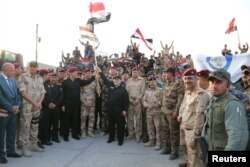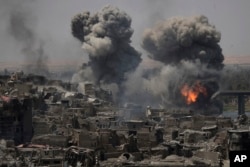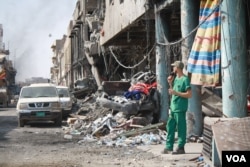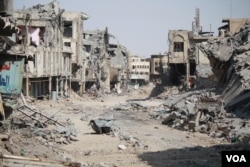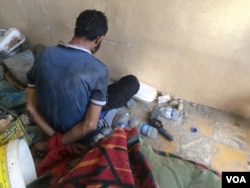U.S. President Donald Trump on Monday congratulated Iraq, its prime minister, and security forces for liberating the city of Mosul from Islamic State.
In a White House statement, Trump said defeating the militant group in Mosul "signals that its days in Iraq and Syria are numbered." He further pledged to "continue to seek the total destruction of ISIS," using an acronym for Islamic State.
Trump said the United States grieves for the thousands of Iraqis who suffered and died at the hands of Islamic State along with the "loss of the heroic soldiers and Peshmerga (Kurdish fighters) who gave their lives."
Prime Minister Haider al-Abadi formally declared victory on Monday in the city that the militant group had declared the capital of its caliphate in Iraq.
Speaking from Mosul's Old City in a speech carried on state television, Abadi said the win is a victory over oppression, brutality and terrorism.
"I declare in Mosul, from Mosul, to all people the...failure and collapse of the terrorist Islamic State," he said.
Abadi said Iraq still faces challenges, including destroying Islamic State terror cells that still exist in the country and creating stability for the entire nation.
The U.S. military welcomed Abadi's statement but said there are still areas of the Old City of Mosul that must be cleared of explosives and possible ISIS fighters in hiding.
Hours before Abadi's speech, witnesses reported heavy fighting still underway in parts of Mosul.
The commanding U.S. general of the coalition operation in Mosul, Lieutenant General Stephen Townsend, said, "This victory alone does not eliminate ISIS and there is still a tough fight ahead. But the loss of one of its twin capitals and a jewel of their so-called caliphate is a decisive blow."
Islamic State still controls some territory outside Mosul as well as much bigger areas in neighboring Syria.
Will it ever feel safe again?
Thousands of civilians have been killed in this battle and 900,000 people have been forced to flee their homes. Vast swaths of Mosul and the surrounding towns and villages have been abandoned, and many people say they will never feel safe going home.
And while no part of Mosul is as thoroughly destroyed as the Old City, neither has any part been left untouched by nearly three years of Islamic State rule and almost nine months of all-out war.
Human rights group Amnesty International released a report Tuesday detailing the loss of civilian life in the battle for Mosul, documenting at least 400 civilian deaths just in West Mosul between January and mid-May.
"The scale and gravity of the loss of civilian lives during the military operation to retake Mosul must immediately be publicly acknowledged at the highest levels of government in Iraq and states that are part of the US-led coalition," Lynn Maalouf, Director of Research for the Middle East at Amnesty International, said.
In parts of East Mosul, recaptured by Iraqi forces in January, recovery is more promising. Shoppers crowd the streets, some of which are newly paved, mostly picking through wreckage left by airstrikes. The government has restored electricity and water supplies in much of the city.
Washington Institute for Near East Policy Distinguished Fellow and former Ambassador James Jeffrey told VOA that relief and recovery efforts are only the first step after the recapture of Mosul.
"The second step is of course political, as always in Iraq," Jeffrey said. "How are you going to prevent a return of ISIS or something like it, and how are you going to incorporate the Sunni Arabs into the larger Iraq and keep the Kurds, who are in it but quite separate, playing a positive role. Those are the big issues we have been dealing with since 2003."





